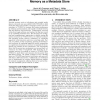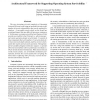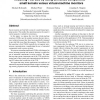2814 search results - page 9 / 563 » Can We Make Operating Systems Reliable and Secure |
FDTC
2006
Springer
13 years 10 months ago
2006
Springer
With physical attacks threatening the security of current cryptographic schemes, no security policy can be developed without taking into account the physical nature of computation....
EMSOFT
2006
Springer
13 years 10 months ago
2006
Springer
Portable systems such as cell phones and portable media players commonly use non-volatile RAM (NVRAM) to hold all of their data and metadata, and larger systems can store metadata...
ACSW
2004
13 years 8 months ago
2004
This paper examines the security aspects of different pervasive scenarios involving agent communities evolved using multi agent systems (MAS). It describes the motivation and the ...
HPCA
2011
IEEE
12 years 10 months ago
2011
IEEE
The ever increasing size and complexity of Operating System (OS) kernel code bring an inevitable increase in the number of security vulnerabilities that can be exploited by attack...
SIGOPSE
2004
ACM
14 years 4 days ago
2004
ACM
Secure systems are best built on top of a small trusted operating system: The smaller the operating system, the easier it can be assured or verified for correctness. In this pape...



